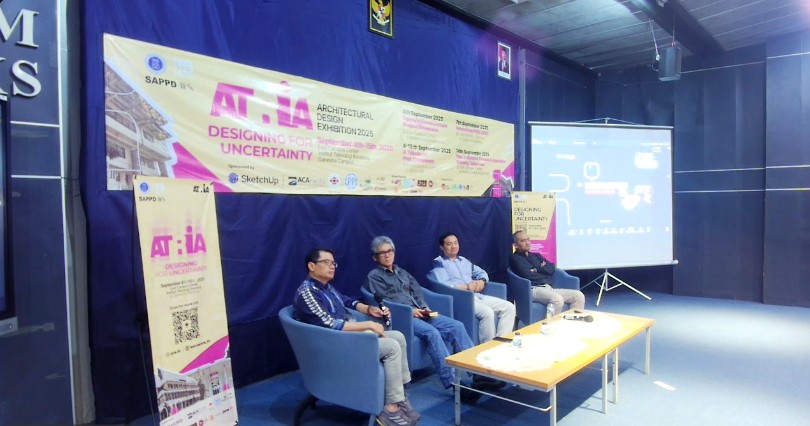LPPM-ITB Builds Indonesia’s Furthermost Regions Starting from Nunukan
By Adi Permana
Editor Adi Permana

BANDUNG, itb.ac.id – Building Indonesia starting from its furthermost regions has been stated by the government of Indonesia in the Nawa Cita by the means of strengthening villages and borders or furthermost regions. ITB’s contribution to Indonesian borders, one of them is implemented by Institute of Research and Community Services (LPPM) in Sei Menggaris, Nunukan, North Kalimantan.
Conducted continuously since 2015, LPPM-ITB has sent their team to implement the community service program for the development of Sei Menggaris and surrounding areas. In the implementation, faculties and schools in ITB such as SITH, FTSL, FSRD, FITB, FTTM, and SAPPK also get involved in the program.
“The community service program is adjusted to the request or need of the target area. If they require something, we do the program accordingly,” said Prof. Budi Sulistianto.
According to Prof. Budi, the key to the program’s success is the support and enthusiasm of surrounding community. At the first year of the program, ITB was asked to make liquid fertilizer and livestock feed out of palm waste because the location is a vast palm plantation. That time, Prof. Budi and team met with an education activist that built State Vocational School (SMKN) 1 Sei Menggaris.
At the second year, ITB was asked to give training on making nata de coco, soy sauce, and yeast. Students of the SMKN even went to internship in SITH-ITB to learn how to make it.
Prof. Budi said that this SMK that is located near Indonesia-Malaysia border has open an opportunity to enhance the human resource and economy of surrounding community. Moreover, founder of the SMKN actively makes development and breakthrough and bring the school to go forward. “Initially the SMKN stood on a mere column. Now, it occupies unproductive palm land, has three buildings, basketball court, computer lab, mosque, and greenhouse.” He said.
*Seminar on making handicrafts in SMKN 1 Sei Menggaris (Doc. LPPM-ITB)
“When we went there, a village discussion was taking place, and we became the facilitator. Everyone committed to develop the SMK as a center of technology, so everyone who wants to ask about seedlings, about mushroom cultivation, and about land cultivation for planting can go there,” said Prof. Budi.
In the third year, LPPM-ITB began to see the problem of clean water availability on the area. Together with FTSL, ITB search for water potential and give the result to PUPR to build. Today, the surrounding residents have access to PLN’s electricity, moving from solar cell they used before. “That’s our participation during 4 years in border region,” said Prof. Budi.
For the effort, Prof. Budi hopes it will bring positive impact to the development of human resources, especially in border region to help national program of building from the furthermost regions that has been stated by the government. “We have planned several things, hopefully this program will encourage improvements,” he said.
*Bamboo seeds planting (Doc. LPPM-ITB)
Secretary for Community Service of LPPM-ITB, Dr. Irwan Meilano said that ITB choose to do differently from others, who emphasize on making programs in many places. “We choose to do some focused and long activity. We do not look for quantity but the quality of an activity and hopefully it will inspire others also,” he said.
According to Irwan, it was first unimaginable to have a progressive school in a remote place. This becomes one of ITB’s contribution in cooperation with many stakeholders about how to manage a school at border region. “And this can be a model, and this SMKN can become an inspiration for other schools, and practically have developed the economy of the community,” he concluded.
The community service is part of Forum Perguruan Tinggi untuk Desa (Pertides). ITB is appointed as the coordinator. Besides Nunukan, there are 4 other places that become the location of partner village of ITB such as Danau Maninjau in West Sumatera, Todanan Blora Central Java, Omah Susu Jepara in Central Javam and Majalengka in West Java.




.jpg)

.jpg)
.jpg)
.jpg)
